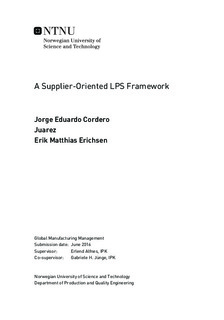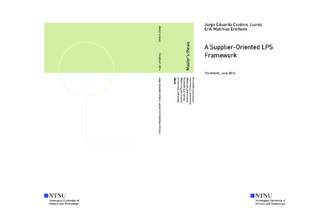| dc.description.abstract | The engineer-to-order (ETO) sector is characterised with a combination of both uncertainty and a wide range of interdependencies between the different entities, especially due to the disintegration of engineering and production. Such characteristics pinpoint the high level of complexity in such sector, which consequently increases the coordination effort required in order to successfully manage an ETO supply chain (SC). In fact, previous literature has shown how the ability to coordinate internal and external processes arises as a challenging necessity for competitive advantage in an ETO SC. Consequently, improving performance in an ETO SC is very much related to the ability to improve engineering and production activities in regards to coordination.
The main intention behind coordination should be to align plans and objectives of individual participants. In regards to complex environments such as ETO, theory suggests how the coordination effort should not be minimized by isolating interdependent functions. However, in order to address effective solutions to the problematic nature of coordination, the different factors affecting coordination need to be better understood. Five factors affecting coordination were identified during the master thesis, including: high level of uncertainty, overlapping engineering and production, maturity of the design technology, geographic dispersion and production capability. It can be concluded that such factors arise due to the overall characteristics of the ETO environment. In other words, such factors are not necessarily avoidable, showcasing the number of challenges which need to be handled throughout an ETO project. Several coordination mechanisms have been suggested in regards to the engineering and production interface and should be matched with the coordination effort needed. However, less focus has been dedicated to how such mechanisms can be implemented and utilized in practice.
The planning process in ETO organizations is considered as a core capability and is consequently an important source for competitive advantage appointed to be the mean to emanate the required coordination mechanisms in the ETO project context. The collaborative planning and control method in the Last Planner System (LPS) has demonstrated coordination improvement in several ETO construction projects around the globe. LPS has a strong focus on achieving a good flow between project units, leaving behind the optimizations for increasing the efficiencies of each individual project unit. The fact that the ETO sector shares to some degree the same peculiarities and consequently many of the same challenges as the construction industry, opens the possibility to adapt tools, approaches and methods from one industry to another.
A conducted analysis enlightened the feature of LPS to structure the coordination mechanisms in practice. Areas of opportunities were identified, where most of the required improvements relates to the involvement of suppliers and their specific participation throughout the project. Specific tasks which can increase the competitive edge due to the coordination effects these activities generate have been suggested by theory. However, it has not been clear on how suppliers should be involved throughout the whole project
development.
A supplier-oriented framework has been presented based on the union between the LPS stages and specific supplier involvement (SI) tasks with the objective of providing the best coordination effects between design/engineering and production, where planning for the supplier is left behind, superseded by planning with the supplier. | |

